- Home
- Lisa Wingate
Good Hope Road Page 6
Good Hope Road Read online
Page 6
Even the numbness, even the cold were not enough to block out the terrible realities of the storm as we neared Poetry. Each step closer to town brought destruction that was more complete, disintegration of the houses more absolute, until finally we crossed the path of the beast on the final hill above Poetry.
I stood frozen in the road, my gaze sweeping a circle, my mind trying but failing to comprehend.
How can this be … ? How could this happen … ? I wanted to shout, but my lips were mute.
Nothing remained. What had once been a small subdivision was barren earth and streets strewn with bits of wood, brick, and stone. The houses had been lifted from their foundations, so that nothing remained but slabs with twisted conduits sticking out and cement stairs that led to nonexistent porches.
All the trees were gone, the trunks snapped like kindling. Climbing over a fallen tree in the road, I stood looking at the neighborhood, remembering a quiet circle of asphalt with perhaps eighteen or twenty homes and massive pecan and oak trees. Cars in the driveways, flowers in the flower beds, toys in the yards.
People. Families. The man who owned the feed store, the lady who worked at the bank, the second-grade teacher who just got married, the Andersons, the Jenkes, the Halls …
Staring at what was left of their homes, I tried to connect the image with the neighborhood I remembered, but it was impossible to comprehend that both were the same place.
Beside me, I heard Caleb whisper something. There’s nothing left, I thought he said, but perhaps it was the voice in my own head. The numbness inside me separated me from the warmth of the day, from the scene around me.
A faint sound of sobbing pressed through the shell.
I turned to see a woman, motionless like a statue on the steps to a nonexistent porch, her head in her hands. I wanted to go to her, to ask her what had happened and if I could help, but I couldn’t force myself to step into that horrible place.
A half-grown cat emerged nearby. Mud-covered and missing a patch of hair along its back, it limped toward me. Squatting down, I touched it, the sensation of its fur weaving through me. Caleb picked it up and gently set it on top of the bag in my arms.
“Here, Jenilee, you know about animals.”
The woman on the steps raised her head and looked at us.
“Mrs. Atherson?” I wasn’t sure if I said her name or only thought it. She didn’t react. My high school gym teacher just looked through me, then slowly put her hands over her face again, first covering her mouth, then sliding her fingers upward, shielding her eyes from the scene around her.
Caleb staggered backward, bumping into my shoulder. I glanced at him, noticing that his skin had gone pale, his face damp with a mixture of sweat and blood.
“Are you all right?”
He didn’t seem to hear me at first. I asked again, touching his arm and shaking him.
He shook his head, reeling sideways, then nodded, blinking hard. “Uh-huh. We better get to town.”
“Here, lean on me.” I slipped under his shoulder, and we continued over the hill toward Poetry, his steps heavier, less steady than before.
In my arms, the muddy cat nestled into the folds of the bag and closed its eyes. My mind crawled into the warm space beside it and hid there. I hardly saw what was around us: the road littered with twigs, papers, bits of houses and cars, fallen trees, smashed cans of food, dented pots and pans, broken glass, the bases of shattered lightbulbs, toy animals with the stuffing hanging out, a mangled bicycle, a splintered baby crib.
Beside me, I heard Caleb gasp in a breath, and I looked up and saw what was left of Poetry.
Nothing remained of Main Street. Where buildings had stood for over a hundred years, there were now only crumbling brown sandstone frontispieces. The wooden walls, the heavy old doors, the blurry blue-tinted plate-glass windows were gone. Vanished, as if someone had dropped a bomb and vaporized anything that was not made of brick or stone.
It was not like anything I could have conjured in a dream. I tried again to connect the image in front of me with the picture of Poetry, where old men sat on benches along the main street, where kids Rollerbladed in the park, and cars lined the street by the café. The images would not meld, as if one could not possibly be the shadow of the other. I clutched tightly to the bundle in my arms, not wanting to see.
No one could have survived this… .
A helicopter flew overhead, seeming out of place, and suddenly everything came into focus in a rush of clarity. I saw movement in the streets below—emergency vehicles, trucks, cars, four-wheelers, tractors. Frenzied movement was everywhere. People were sifting through piles of rubble, working in human chains to clear away collapsed stones. Jess Carter was walking the streets of a devastated neighborhood on the west side of town with one of his hound dogs on a leash, sniffing through the piles. The dog zigzagged from one house to the next in eerie silence, Jess following heavily behind him.
A pickup truck rushed up the main street, rattled over loose bricks and chunks of stone, then turned into the driveway that led to the old armory building east of town.
Caleb’s arm pressed heavily on my shoulders as we walked closer.
“There’s nothing left but the armory,” I whispered, staring at the building that towered on the hill above the baseball fields. The armory parking lot was filled with people lying on cots, lawn chairs, and tarps. Here and there people moved through the maze, carrying blankets, water bottles, cups, various belongings.
Caleb slipped his arm from around my shoulders as we turned off the road and started up the hill. I watched him stumble on the uneven surface.
“We need to find a doctor,” I said. “You need a doctor.”
He shook his head, mopping the blood-soaked sweat from his forehead with his sleeve. “I’m just … tired. My feet are numb. I just need”—he blinked hard, seeming to shake off the fog—“something to eat. I’ve got to find out about my grandpaw, whether or not he was in town yesterday when the tornado hit. He comes over here from Hindsville on Fridays for ministers’ meetings at the … ummm … the Poetry Café. I need to … make sure he’s all right.”
“There’s Doc Howard,” I said, spotting Doc near the edge of the parking lot, wrapping a little girl’s arm. Beside him, Mazelle Sibley, the old lady who used to run the school lunchroom, was holding a box full of bandages, patting the little girl on the head like a puppy. She frowned at me as we came closer, the same way she used to at school. I remembered how glad I was when she retired and went to work helping her son run his convenience store outside of town.
She noticed Caleb, set down the box, and hurried to his side, elbowing me out of the way. “Why, Caleb Baker, my lands, what has happened to you?” She gave me a narrow glance, like she thought I might have been the cause of it. “Lord, you look a sight! It near scared me to death when I caught sight of you just now! Land sakes! Look at that swollen eye.”
Caleb mopped his forehead again. “My grandad. Have you heard anything about my grandad? Was he here in town when the tornado hit? It didn’t hit over near Hindsville, did it?”
Mrs. Sibley patted his hand, then grimaced at the blood on her fingers and stepped away to wipe it on the edge of a towel. “No, he’s all right, I’m sure. He came by our store on his way out of town yesterday, headed back to Hindsville just after lunch. I’m sure he’s fine. You know, as he was leaving, he said, ‘May the good Lord bring you the blessings you deserve today, Mazelle.’ That’s what he said, and I’m sure that’s the reason I survived this terrible storm. Survived without a scratch out in the old icehouse, while the store was torn to bits. I’m sure it was because of Reverend Baker’s special blessing that I survived. Why, it’s—” Across the parking lot, someone cried out in pain, and Mazelle jumped, reaching up with trembling hands to cover her ears.
Part of me wanted to do the same, to block out the sounds around me—the low moans of pain, the high-pitched whimpering of children, the sobbing of men and women, the low murmur of rescue w
orkers’ voices, and somewhere in the distance the baying of Jess Carter’s hound dog.
Maybe he found someone. Someone who survived.
I looked around the makeshift hospital, my head reeling. The scene was like something on the evening news. People were everywhere, bleeding, crying, hugging one another. I knew most of them—the beauty-shop lady, the first-grade teacher, the new preacher from the Church of Christ, his wife who sold Avon, Wallie Mitchum who ran the feed store.
He was by just yesterday complaining that we owed a seven-hundred-dollar feed bill.
I knew their names, but they were not the people I remembered from a day ago, a week ago.
They looked past me as if they didn’t see me.
I stared at a woman, Bob Anderson’s wife, I thought, clutching a baby blanket to her chest, her face turned skyward, her mouth opening in silent sobs, her body rocking back and forth in agony. I thought of the picture of the baby girl.
Was that her baby? Did they have their baby yet? I couldn’t remember. I didn’t want to know.
“Jenilee …” Doc Howard’s voice startled me, and I realized he was standing beside us. He looked exhausted, blood-spattered, hollow-eyed. He was rubbing his hand over his heart, the way he used to before his heart attack. “Well, I have to say I’m glad to see you. Weldon Gibson said you’d gone back home after the tornado. I was worried. You took a nasty whack on the head yesterday.”
I shrugged off Doc Howard’s concern, the way I used to when I worked at the vet clinic. Doc always asked too many questions about home. “Are Mrs. Gibson and Lacy all right?”
Doc Howard nodded. “Weldon said his mother is resting. Lacy isn’t talking, and he’s concerned about that. We haven’t been able to get out there to check on them this morning. It’s taking all hands to care for the injured here. We finally located a medical doctor, a fellow who’d been out at the resort golfing before the storm. Sheriff’s deputy brought him back here sometime after midnight.” He reached up and parted my hair, looking at the goose egg where my head hit the wall of Mrs. Gibson’s cellar. “You’d better come in here and get yourself looked at. That head wound is pretty swollen today. You should be checked for a concussion.”
“I’m all right, but something’s wrong with Caleb. He’s sweating and he can hardly stand up. He wasn’t that way earlier. He said his feet are numb.”
Beside me, Caleb was bent over with his hands braced on his knees. Mrs. Sibley was fanning him with a towel, saying, “Oh, dear. Oh, dear. Take deep breaths, Caleb.”
Caleb batted a hand at her and the towel. “I’m all right. I just need something to eat.”
Dimly, I felt the cat move against my chest. “I found this cat at the top of the hill,” I muttered, watching Caleb. “I don’t know what’s wrong. He was talking just fine when we found each other by Judy Creek, but something’s wrong now. He said he was delivering cattle at the Ganns’ place when the tornado came through, and he was trapped under a barn all night.”
“What?” I felt Doc Howard’s fingers go around my elbow. He took the cat from my hands and set it down. “You’d better come on in here and see the doctor. You’re not making sense. Did you and Caleb come in here together? How did you two get here?”
“We … we walked,” I said, balking as he tried to force me to move forward. I stepped back instead, breaking his hold on me.
Doc Howard looked surprised. “You shouldn’t have walked here. There are power lines down everywhere, and flash flooding. The tornado came right through town, then zigzagged back and forth across the road for six miles out your way. Nineteen confirmed tornadoes yesterday afternoon, all through the tristate area.” He wiped his eyes with his sleeve, shaking his head. “Never seen anything like it. It’s like hell broke loose yesterday. Twenty-seven towns and cities were hit hard, including Kansas City and the theme park at Cato Creek. We’ve got Lord knows how many people missing at the lake. Everyone was gathered there for the big bluegrass music festival.”
I shook my head mutely. Why would something so terrible happen?
Caleb stood up, and Mrs. Sibley put her hand on his arm, patting him with the towel wrapped around her hand. “You come on over here and let the doctor look at you, Caleb. Come on now. Your granddaddy would never forgive me if I didn’t take care of you. Why, just yesterday, I was telling your grandfather I had kept you in my prayers after you were in that car accident last year, and—”
Doc Howard pulled me forward a few steps until we caught up with them. “Take Jenilee, too,” he interrupted. “Have the doctor look at her. She got a nasty bump in the head yesterday.”
“Oh, of course, Dr. Howard,” Mrs. Sibley said sweetly, adjusting her glasses so that she could look down her nose at me, the way she always did, the way that said white trash without saying the words out loud. Under her breath, she muttered, “Come on, Jenilee,” just the way she used to in the lunch line at school, when she could tell I didn’t have any money. Come on, Jenilee, go around the side and get a peanut-butter sandwich, she’d say loud enough so that everyone would hear. You know a peanut-butter sandwich is what we serve to those who have too many lunch charges. Haven’t your parents filled out the forms for charity lunch yet?
I stopped walking, and looked down at the concrete to keep from having to look at her. “I’m fine. Go ahead without me.” I caught up with Doc Howard before he could walk away. “Have you heard anything about my father and Nate? Are they here? They were headed to the cattle sale in Kansas City yesterday. They never came home.”
Doc Howard hooded his eyes. “There’s not much news coming in. There’s damage all over the area—hundreds of miles in both directions. The radio and TV stations are out. Every hospital for sixty miles is full, and most of the roads going anywhere north are either closed with rubble or flooded, so if your father and Nate are stopped somewhere along the way, they wouldn’t be able to get in touch with you. We’re hoping to have cell phone communication later today, and maybe some of the disaster relief agencies coming in. Right now, everyone’s busy in areas that were hit harder than Poetry. It’ll be a little easier to get information once we get some outside help. Thankfully, there haven’t been any fatalities yet in Poetry.”
I squinted against the sun, looking around the parking lot in disbelief. It was hard to imagine that ours was just a small disaster, that there was worse destruction elsewhere, and that Daddy, Nate, or Drew might be in the middle of it. Blood drained from my face and ran hot and bitter like acid through my body.
Doc Howard squeezed my shoulder. “I know it’s hard to wait.”
His kindness touched some soft spot inside me, and I felt myself start to crumble. Taking a deep breath, I closed my eyes and rebuilt the wall between the rest of them and me. When I looked at him again, he was watching the loading dock with a look of concern. I glanced over just in time to see Caleb stiffen and crash to the cement like a fallen tree, then thrash wildly on the concrete.
Doc Howard grabbed his bag from the little girl’s cot and ran forward. I followed, my mind flashing back to all of the times Doc Howard and I had dealt with injured animals together.
“He’s having a seizure!” I hollered, trying to reach Caleb. “Get his head! Hold his head!” I screamed, but Mrs. Sibley just stood frozen. Doc Howard pushed her out of the way and fell to the ground, trying to protect Caleb’s head. I slid into place beside him, helping to keep Caleb’s head from hitting the concrete.
“It’s all right, Caleb. Hang in there, son. It’s all right.” Doc Howard leaned close to Caleb’s face, trying to keep his attention. “We’re just going to try to keep you from hurting yourself until this thing is over. Try to be calm, son. Can you talk? Can you tell me what’s wrong?” He glanced over his shoulder at Mrs. Sibley. “Where’s Dr. Albright? Get Dr. Albright!” The words were barely out of his mouth when a man in a bloody lab coat ran out of the building to us.
“Head trauma?” he asked, his voice calm and emotionless, an odd contrast to Doc Howard and me. “Can
anybody tell me what happened to him?” He tried to shine a flashlight into Caleb’s eyes as the seizure slowed and Caleb’s body relaxed.
I found my voice. “He was fine an hour ago … he seemed fine. He was caught in the tornado yesterday. He said he was knocked out and trapped under some boards, but he seemed fine.” Caleb’s face relaxed and he looked desperately at me. “He said he was fine, except that his feet were feeling numb, that he needed something to …” Something from the past clicked in my mind as Caleb’s body started to stiffen again. I remembered running into him behind the bleachers at school years before, and him turning away, trying to hide a needle, making a face at me and saying, It’s insulin, all right … ? “He’s diabetic!” I exclaimed, leaning close to his face. “Come on, Caleb, stay with us. Am I right? Are you having a diabetic low?”
Caleb nodded, and the doctor in the lab coat jumped to his feet, “I need IV dextrose!” he shouted, running toward the armory. “Somebody get me IV dextrose!”
Caleb stiffened again, and Doc Howard held his head. “Hurry!” he called over his shoulder. “We need that IV!”
Frantically, I dumped the contents of the doc’s medical bag, grabbed an IV needle, and tore open the package. Pinning Caleb’s arm between my legs, I pressed a vein and slipped the IV in, then held it. “It’s in. Where’s the IV?” I hollered. “Where’s the bag?”
“I’ve got it.” Hands closed over mine, slipping the tube onto the IV needle, then taking Caleb’s arm from me. “I’ve got it,” the doctor said again, his eyes catching mine for just an instant. “Get me tape.”
“Here you are, Dr. Albright.” Mazelle Sibley elbowed me out of the way and held out a piece of tape. He handed her the IV bag, and she stood above Caleb with it pinched between her fingers.
I sank against the concrete and pulled the hair away from my face, my entire body starting to shake. I realized everyone, including Dr. Albright, was staring at me.
“It’s all right, Caleb. It’s all right now,” I heard Mazelle Sibley say as Caleb relaxed and started to open his eyes. She swiveled her head and glared at me. “Good Lord, Jenilee Lane, what in the world did you think you were doing? This isn’t one of your animals you’ve dragged home from the woods. You’re lucky you didn’t kill him. Good Lord. For heaven’s sake. Let’s get him inside to a bed. I’ll take charge of him.”

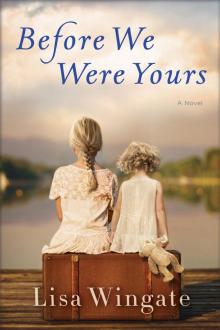 Before We Were Yours
Before We Were Yours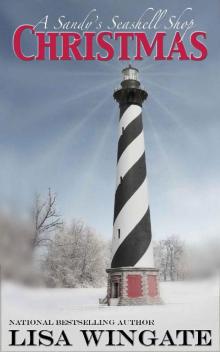 A Sandy’s Seashell Shop Christmas
A Sandy’s Seashell Shop Christmas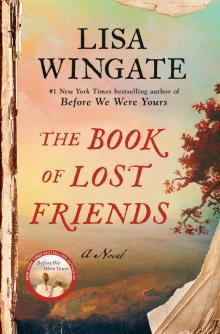 The Book of Lost Friends
The Book of Lost Friends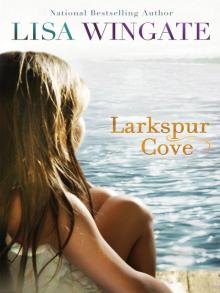 Larkspur Cove
Larkspur Cove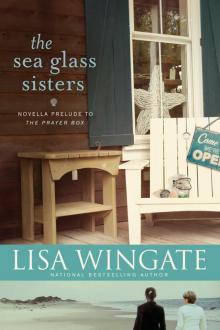 The Sea Glass Sisters
The Sea Glass Sisters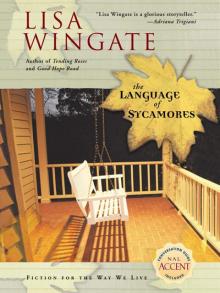 The Language of Sycamores
The Language of Sycamores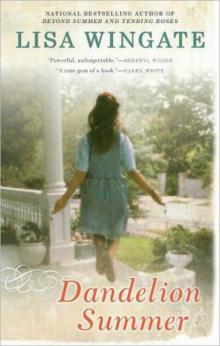 Dandelion Summer
Dandelion Summer Word Gets Around
Word Gets Around Beyond Summer
Beyond Summer Firefly Island
Firefly Island The Tidewater Sisters: Postlude to The Prayer Box
The Tidewater Sisters: Postlude to The Prayer Box Talk of the Town
Talk of the Town![Blue Sky Hill [01] A Month of Summer Read online](http://i1.bookreadfree.com/i1/03/29/blue_sky_hill_01_a_month_of_summer_preview.jpg) Blue Sky Hill [01] A Month of Summer
Blue Sky Hill [01] A Month of Summer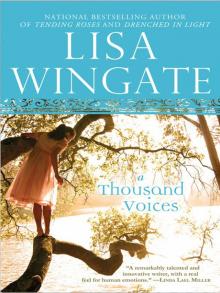 A Thousand Voices
A Thousand Voices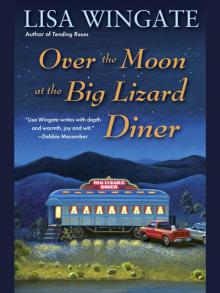 Over the Moon at the Big Lizard Diner
Over the Moon at the Big Lizard Diner Never Say Never
Never Say Never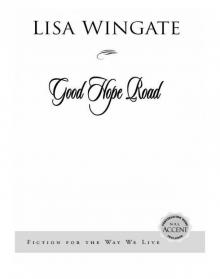 Good Hope Road
Good Hope Road The Summer Kitchen
The Summer Kitchen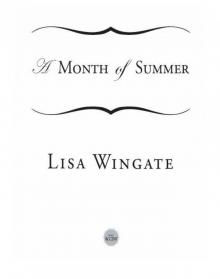 A Month of Summer
A Month of Summer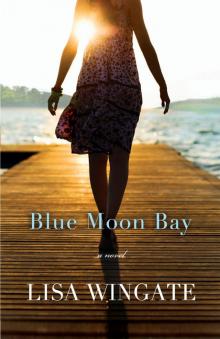 Blue Moon Bay
Blue Moon Bay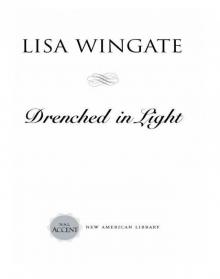 Drenched in Light
Drenched in Light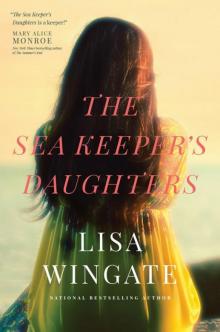 The Sea Keeper's Daughters
The Sea Keeper's Daughters